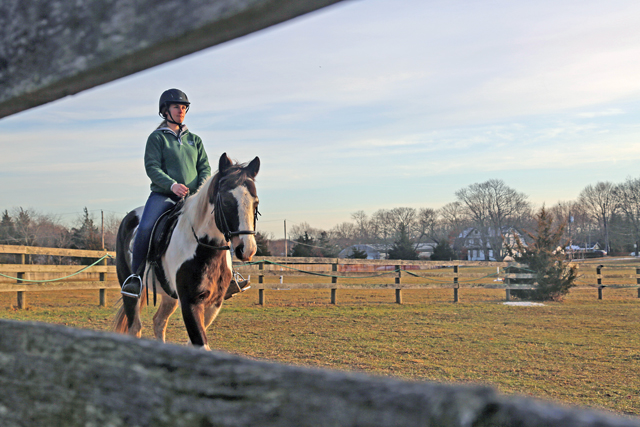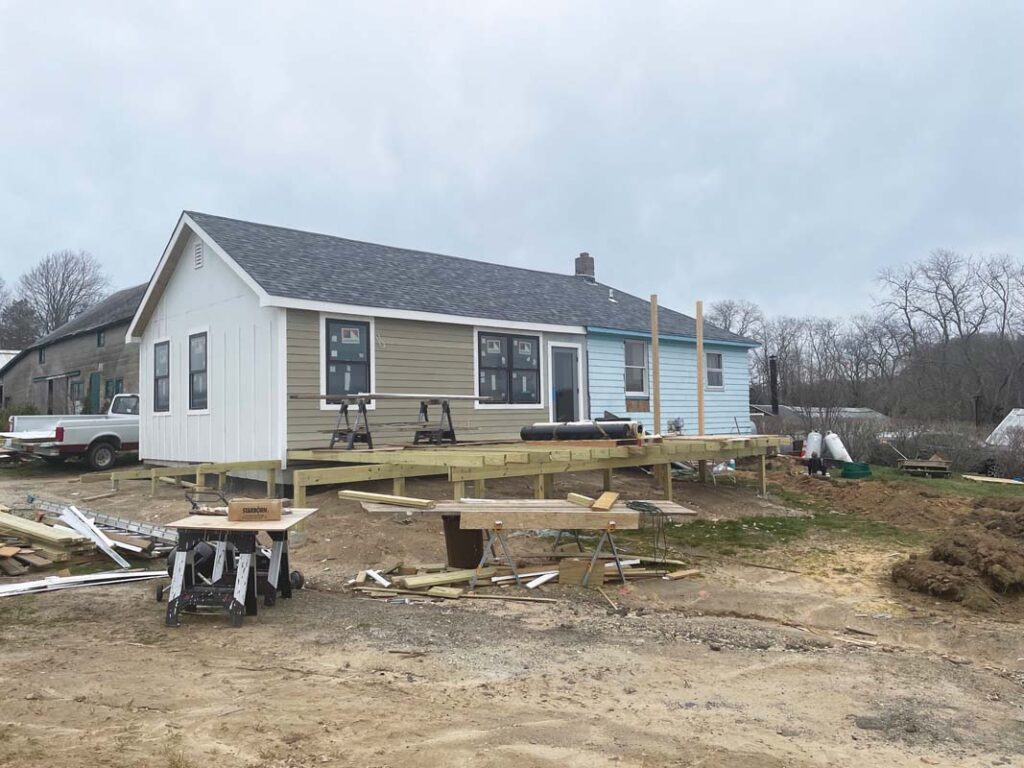Therapeutic riding program teaches healing with horses


Leonard Dank never intended for Foxrun Farm to become home to a therapeutic horse riding program. But when riding instructor Maryanne D’Auria began boarding horses at the Cutchogue property, and he learned that one of her former students had benefited from a similar program and gone on to become a successful competitive rider, he was instantly hooked on the idea.
“It’s a learning process for myself to watch this,” Mr. Dank said. “Something new in life.”
Ms. D’Auria met Scott Tongue while giving lessons and directing a therapy program at Red Barn Therapeutic Riding in Old Brookville. Mr. Tongue, who has Asperger’s syndrome and was 8 years old at the time, wanted to learn how to ride and to address a balance problem
that sometimes made him fall over.
“Therapeutic riding can help people with disabilities to be cognitive, to be physical,” said Mr. Tongue, who is now 29 and lives in Hicksville. “I started riding because I had a balance problem and it helped me adjust.”
In addition to helping his balance, the sessions cultivated an interest in riding that led to Mr. Tongue competing around the state and overseas. With Ms. D’Auria as his coach in 2003, he competed in the Special Olympics World Summer Games in Dublin, earning a gold and silver medal.
“I was totally impressed,” Mr. Dank said of hearing about Mr. Tongue’s success.
Foxrun Farm has 25 acres that include wooded and open-field trail riding, an outdoor riding ring and a practice jump ring. Its North Fork Therapeutic Riding Program launched in 2015 and usually has around five horses at any given time.
Now in the process of becoming a nonprofit, Mr. Dank said the program is a way for the farm to give back to the community. He’s working on connecting with local schools to raise awareness of the program among special education students. About 100 children — some with developmental disabilities, others without — have taken lessons with Ms. D’Auria so far.
Therapeutic riding lessons differ from traditional lessons only in the way Ms. D’Auria takes time to consider each student’s needs. The goal isn’t to cure someone of their disability, she said, but to determine how much help they need and teach them to ride in a way that works for them.
Ms. D’Auria said she enjoys working with students and seeing how horses can give back to people. But as an instructor, she still thinks about competitions, so she hopes to develop a Special Olympics program at the farm this spring.
“I’m not a physical therapist — I’m a riding instructor — but students of mine have said to me over and over again that it’s a form of physical therapy without having to go to a doctor’s office,” she said. “It’s just a different kind of environment.”
In 25 years of instructing, Ms. D’Auria has found that therapeutic riding helps people with disabilities develop and enhance motor skills and correct posture, muscle tone, eye-hand coordination. It’s also a form of exercise.
“They just seem happy, positive,” she said. “It builds self esteem and it can carry over into other areas of their life such as family and school. It just gives them a sense or feeling that they can be a part of something.”
Learning to ride and control an animal as large as a horse requires adopting physical skills that can be learned, and the relationship with the animal offers a powerful emotional bond, she said.
For Mr. Tongue, the best part about riding is spending time with the horses. Now a horse owner himself, he rides two to three times a week.
“He was just a student that really, really liked riding and stuck with it,” Ms. D’Auria said. “He enjoys the sport. Some people do it for something they need to do, but he actually enjoys riding a horse the way I do.”
Some of the horses in Foxrun’s program are rescues — retired race animals that didn’t make it big in competitions and needed a home when their careers were over.
Horses that learn to be calm enough to work with students can also benefit from the program, Ms. D’Auria said.
“It gives them a home. It gives them a job,” she said. “It helps them pay their way, but they help people as well.”








